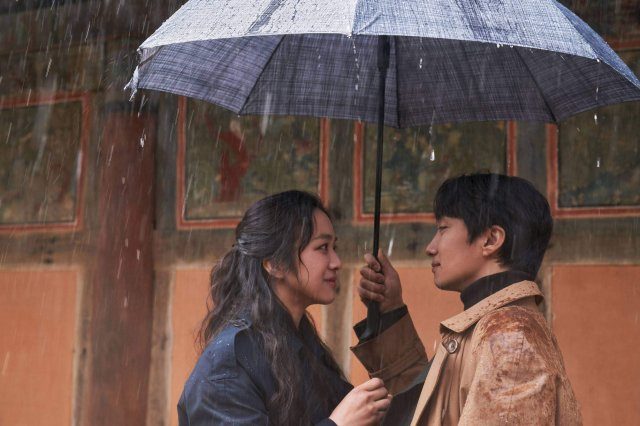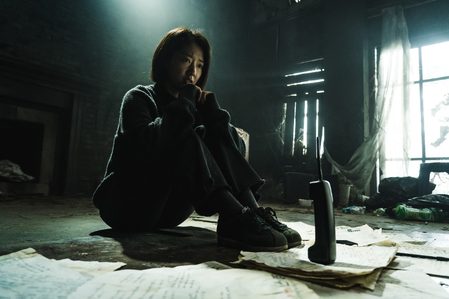SUMMARY
This is AI generated summarization, which may have errors. For context, always refer to the full article.

Hae-joon (Park Hae-il) has trouble sleeping. He’s a detective from Busan with unsolved cases on his wall looming over his head, like the flies and ants that feast on the bodies of dead victims throughout the film. Soon, Song Seo-rae (captivatingly played by Tang Wei) enters his life as an innocuous yet alluring Chinese woman who focuses on assisting the elderly. Because of her, he finally learns how to sleep.
Tragically, their meeting is anything but a meet-cute. Seo-rae is a suspect in the rock-climbing accident that killed her husband. Gradually, the odds stacked against Seo-rae become too much to ignore, and everyone can see it except one person. Hae-joon is so full of love that he’s been rendered defenseless. But his biggest mistake wasn’t falling in love. It was believing that he could solve an unsolvable case.
Decision to Leave has Park Chan-wook’s signature brutality and sexpionage, but they’ve been placed in the background, focusing instead on the tender romanticism that is as explosive as the violence.
Compared to previous works like Oldboy, The Handmaiden, and Lady Vengeance, Park limits his excess, and there is palpable restraint in his storytelling. His oeuvre has conditioned viewers to prepare themselves for twists and turns that always turn out ironic or tragic. Here, the irony is inscribed in the tragedy itself since Seo-rae becomes both Hae-joon’s rose and thorn, and vice versa.
Considering the context of genre filmmaking, Decision to Leave functions as a neo-noir romance with a familiar conceit. A detective falls in love with his suspect, a premise found in other crime thrillers like Basic Instinct, Double Indemnity, and Sea of Love. But Park isn’t interested in simple semiotics, and in fact, he has never brought up “film noir” or “femme fatale” in any of his press releases.
It’s because the film relishes in throwing away conventions in favor of mastering “the basics” of the genre. Characters may seem artificially constructed from a combination of tropes, but screenwriter and frequent Park Chan-wook collaborator, Jeong Seo-kyeong, makes sure to craft a naturalistic setting wherein little things like technology, police work, and, surprisingly, cooking are intimately intertwined with the romance.
No other performance evokes this mastery of the basics than Tang Wei’s turn as Seo-rae, who knows how to twist a knife so effortlessly with her wistful looks and hypnotic allure. Having already shown her seductive potency in Lust, Caution, and a lesser-known somber turn in Late Autumn, Wei flexes her discreet charms without having to fall under “femme fatale” trappings.
Having been subject to trauma, displacement, and abuse, conventional wisdom says that Seo-rae should turn into a Sharon Stone-type character. The other detectives seem to think she already is. In a scene where she briefly laughs at an inquiry about her husband’s death, the investigators find this as proof of her conniving, but part of it is the language barrier she experiences as a Chinese woman. In reality, she’s genuinely humane and tenderhearted.
The only language Seo-rae excels in is caring for others, which translates remarkably well to Hae-joon. Here comes a detective, who, by all means, is expected to treat her like vermin, yet, instead, Park Hae-il’s performance allows an air of sympathy for her, which leads to some wonderful chemistry (and lots of savory Korean cooking).
For Park Chan-wook, it was only logical that their romance developed: “What I wanted to create was a film where the police procedural is not separated from the romance, where the investigation in itself is a process of their love blossoming.” And so, as Hae-joon surveys Seo-rae’s windows to catch her in the act of wrongdoing, he imagines himself inside of her intimate space, shattering the wall between the hunter and hunted. As Seo-rae so eloquently puts it: he wasn’t spying on her, he was guarding her.
An underseen aspect of the romance thriller is the prominence of technology, which now sees extended visibility in this film. And it makes so much sense since phones, watches, GPS trackers, and so on have become symbols of privacy and secrecy. Simple recordings on a smartwatch or clandestine text messages on the phone have the capacity to surface the subconscious feelings of characters.
Cinematographer Ji-yong Kim is cognizant of this connection, opting to have shots be constructed from the inside of the LED screens of computers and smartphones, often overlapping these gadgets onto the faces of the characters indulging in taboo affairs. Technology has broken barriers but, in a way, has created new ones. In the vast history of cinema, never has the translation of a phrase and the playback of a voice recording ever been this heartbreaking.
Much can also be said about the film’s beguiling beauty. Domestic settings are filled with intricate patterns that further mystify the film’s characters. Police spaces look less like stringent locations and more like accommodations for the seeds of love. And most interesting of all is the film’s focus on a rugged mountain and its disjuncture with harsh ocean waves.
Hae-joon and Seo-rae’s forbidden romance invades these spaces, effectively transforming them into sanctuaries of intimacy and healing. Hae-joon is like a mountain, unmoving and steadfast, but Seo-rae is like the ocean, mystic and tempestuous, forcing her way to meet the mountain despite all laws of nature telling her not to. Two places seemingly out of reach, like the cop and the criminal who can never truly find solace in one another.
It’s fitting that in the end, Park Chan-wook refers back to the song that inspired him to make the film in the first place. As Hae-joon braves the tides to find Seo-rae, the line between love and detective work unravels once again. Hae-joon may think he’s searching for his lover, but what he’s really doing—what he’s always been doing—is thinking he could solve an unsolvable case. “Since no one knows your whereabouts. My lonesome journey in this fog will never end.” – Rappler.com
Decision to Leave is now showing in Philippine cinemas.
Add a comment
How does this make you feel?

There are no comments yet. Add your comment to start the conversation.